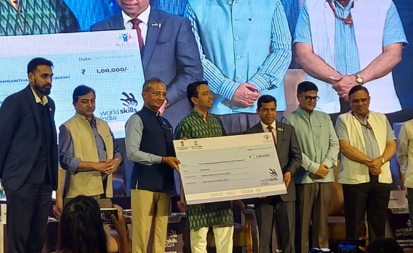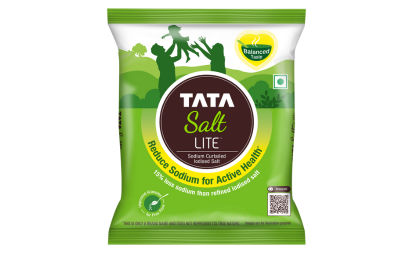8th meeting of Agriculture Ministers of SCO countries chaired by Union Minister Shri Tomar
SCO adopted smart agriculture action plan under the chairmanship of India Prime Minister Shri Modi's emphasis on the overall development of agriculture through technology - Shri Tomar The 8th meeting of Agriculture Ministers of Shanghai Cooperation Organization (SCO)
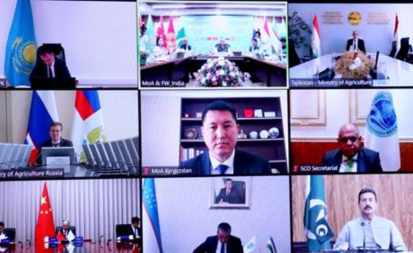
SCO adopted smart agriculture action plan under the chairmanship of India
Prime Minister Shri Modi’s emphasis on the overall development of agriculture through technology – Shri Tomar
The 8th meeting of Agriculture Ministers of Shanghai Cooperation Organization (SCO) member countries was held today through video conferencing under the chairmanship of Union Agriculture and Farmers Welfare Minister Shri Narendra Singh Tomar. Russia, Uzbekistan, Kazakhstan, Kyrgyzstan, Tajikistan, China and Pakistan participated in it along with India. Under the chairmanship of India, SCO member countries adopted the Smart Agriculture project. Expressing satisfaction over the smart agriculture action plan and the initiative of innovation in agriculture, Shri Tomar said that Prime Minister Shri Narendra Modi’s emphasis is on the overall development of agriculture in the country through technology. In this direction, India has taken several concrete steps to promote smart agriculture.
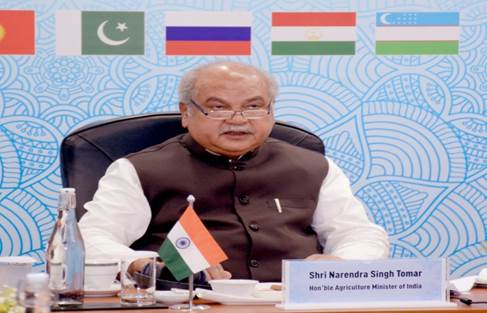
Welcoming everyone to the SCO meeting on behalf of India, Union Minister Shri Tomar said that India gives importance to its relations with SCO in promoting multilateral, political, security, economic and people-to-people interactions. It is a matter of pleasure and pride for us to organize a meeting of SCO Agriculture Ministers to discuss strengthening cooperation in food security and nutrition, especially in the current situation. Shri Tomar said that in order to maintain the normal functioning of the food supply chain in the present conditions, there is a need for close contact and cooperation between various countries for food and nutrition security. He added that India is the largest employer globally in the agriculture sector, where more than half of our population is engaged in agriculture and allied sectors, while India also represents an important economic activity for many countries. Its importance is also evident from the fact that the budget allocation for agriculture and allied sectors in India has increased more than 5 times in 10 years from 2013-14. Over the years, India has performed well in the agriculture sector, contributing to global food security with food grain production, registering a significant growth in exports, and exports of agricultural and allied products have crossed Rs 4 lakh crore.
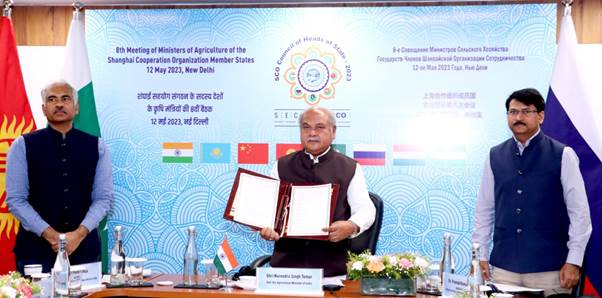
Shri Tomar said that India’s public distribution system and price support system for farmers are unique in the world. It is the good result of foresight of our policy-makers, efficiency of agricultural scientists and tireless hard work of farmers that today India is self-sufficient in food grains. India is a leading producer of many commodities like cereals, fruits, vegetables, milk, eggs, fish. He said that the welfare of the farmers and overall development of the agriculture sector has been the top priority of the Government of India. India, with its comprehensive development path in the agriculture sector, will continue to share its best practices and build capacities with other countries, bilaterally as well as in collaboration with international organizations, so that they too become self-reliant and food secure nations. He said that the rich agricultural research has played an important role in solving the issue of food security, improving the income of farmers and agriculture workers and also for the sustenance of the people. Efforts are being made by the Government of India to make the country self-reliant in the agriculture sector with concerted efforts in innovation, digital agriculture, climate smart technologies, development of high yielding, biofortified varieties, agricultural research. Efforts are being made to improve the life and livelihood of the farmers by making their agriculture sustainable and friendly.
Referring to the country’s very important Prime Minister Kisan Samman Nidhi scheme, Union Minister Shri Tomar said that under this, crores of farmers across the country would get Rs.6,000 per year are being given and so far about Rs 2.40 lakh crore has been deposited in the bank accounts of the farmers. Deposits have been made. Crores of farmers have been provided concessional institutional credit with a focus on extending Kisan Credit Cards to farmers and covering all PM-Kisan beneficiaries through these. Under the able leadership of Prime Minister Shri Modi, India is also promoting organic farming and natural farming with emphasis on sustainable productivity, food security and soil health. A plan has been started to promote and form 10,000 new Farmer Producer Organizations (FPOs) to increase the economic potential of small and marginal farmers by adding them to farmer groups. 1 lakh crore to develop infrastructure in rural areas. Agriculture Infrastructure Fund has been set up. India has taken several measures to increase the use of digital technologies in agriculture. National e-Governance Plan in Agriculture, Agristack and India Digital Eco-system for Agriculture etc., under which most of the schemes are being digitized and brought on a single platform, so that farmers can easily access these schemes and take benefits from them.
He said that insurance cover is being provided to the farmers under the Pradhan Mantri Fasal Bima Yojana, under which Rs. are given. Electronic National Agriculture Market has been developed to increase market access of farmers. India has also launched programs to create new irrigation infrastructure, conserve soil fertility including balanced use of fertilizers, provide farm-to-market connectivity, ICT linkages, etc., with the goal of increasing farmers’ income. The vision of empowering farmers, farm women, rural youth is being taken forward by taking large scale lab-to-land initiatives by developing new technologies and methodologies. In view of the importance of food-nutritional security and climate-friendly Mr. Anna, he also urged the SCO countries to support the International Year of Millets declared by the United Nations on India’s proposal and said that India should achieve two sustainable development goals, that is, ending hunger, providing food Determined to obtain protection and nourishment. Bio-fortified varieties are a source of staple food rich in micronutrients and are being promoted continuously to address malnutrition in the country.
At the beginning of the meeting, Shri Manoj Ahuja, Secretary, Union Ministry of Agriculture and Farmers Welfare gave a welcome address. Representatives of the SCO Secretariat as well as the Central Agriculture and high officials of the Ministry of Farmers Welfare and senior officials of SCO member countries participated.
—–
 English
English French
French German
German Italian
Italian


